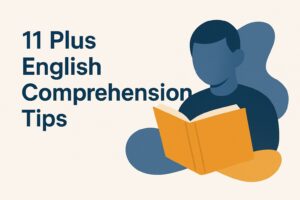
How To Prepare For 11 Plus Maths
Ready to tackle the 11 Plus Maths exam? It’s not just about numbers; it’s a pivotal step in your child’s educational journey. Understanding the exam structure, assessing strengths and weaknesses, and creating a solid study plan are all crucial.
Plus, we’ll dive into essential topics and effective practice techniques that could make all the difference. Let’s unlock the secrets to mastering 11 Plus Maths together—your roadmap to success starts here!
Understanding the 11 Plus Exam
The 11 Plus exam generally consists of sections covering mathematics, English, and reasoning, with the mathematics component focusing on problem-solving and logical reasoning tasks.
Within the maths section, you will encounter a variety of question types, including arithmetic, geometry, and data handling. Some questions may require students to solve word problems, interpret graphs, or calculate the areas of different shapes.
For example, a typical question might be,
“If a rectangle has a length of 10 cm and a width of 5 cm, what is its area?”
Time management is essential, as students typically have around 45 minutes to answer approximately 30 questions. Familiarising oneself with past paper questions can be a highly effective strategy, allowing candidates to understand the exam format better and improve their speed.
Importance of Maths in the 11 Plus
Mathematics plays a vital role in the 11 Plus examination, as it evaluates not only computational skills but also logical reasoning and problem-solving abilities.
To enhance performance in the 11 Plus, it is essential to master key mathematical skills. Concentrating on topics such as mental arithmetic, ratios, and basic geometry can be particularly beneficial, as these areas frequently appear in exam questions.
For example, practising quick calculations can improve speed, while a solid understanding of ratios is crucial for effectively tackling proportion problems. Research has shown that candidates who achieve scores above 70% in mathematics often have a passing rate of over 85%.
To support preparation, consider utilising resources such as past papers and online platforms like IXL or Mathletics. These tools offer targeted practice and provide instant feedback, allowing candidates to monitor their improvement effectively.
Assessing Your Current Level

Understanding a student’s current level of understanding in mathematics is crucial for developing an effective preparation strategy for the 11 Plus examination. This approach aligns with the principles outlined in our analysis of Empowering Parents.
Identifying Strengths and Weaknesses
Conducting a diagnostic test can effectively highlight a student’s strengths and weaknesses in mathematics, enabling the development of targeted improvement strategies.
To begin, one might consider utilising IXL, which is available starting at £19.95 per month. This platform offers interactive diagnostic assessments tailored to various year groups. Alternatively, CGP’s diagnostic papers provide a more structured approach to skill assessment.
Once the test has been administered, it is important to analyse the data to pinpoint specific areas that require improvement, such as particular maths concepts or problem-solving techniques.
From there, one can create a focused plan that prioritises these areas, incorporating targeted practice sessions and supplementary resources like online tutorials. It is advisable to regularly reassess progress every few weeks, allowing for adjustments to the plan as necessary to ensure continuous growth.
Using Past Papers for Assessment
Utilising past papers from reputable sources provides valuable insight into the structure of the 11 Plus exam and the types of questions that may be encountered. To access these past papers, one can visit the GL Assessment website and navigate to the resources section, where downloadable PDF versions of previous exams are available.
These papers serve as effective tools for both assessment and revision by simulating actual exam conditions. It is beneficial to set a timer and complete a paper in one sitting to evaluate understanding and time management skills.
After that, reviewing the answers using the provided marking scheme will help identify areas that need improvement. Consistent practice in this manner will significantly enhance confidence and preparedness for the actual exam.
Creating a Study Plan
A well-structured study plan is essential for maintaining consistent preparation, as it ensures that all necessary topics are thoroughly covered before the exam date. To understand what constitutes an effective study plan, our guide on what should be in an 11 Plus study plan offers detailed insights.
By following a clear plan, individuals can manage their time effectively and reduce last-minute stress, leading to a more confident and prepared approach to the exam.
Setting Realistic Goals
Setting SMART goals—Specific, Measurable, Achievable, Relevant, and Time-bound—can greatly enhance a student’s focus and motivation in their studies.
For instance, a student might decide to master fractions by 15 February, committing to practice problems for 30 minutes each day. This goal is both specific and measurable, as it clearly outlines the topic and establishes a deadline.
Another actionable goal could be to complete five past exam questions on percentages by 1 March. This approach encourages consistent engagement with the material.
By breaking the preparation down into these concrete steps, the student can effectively track their progress and adjust their study plan as necessary.
Allocating Time for Each Topic
Effective time allocation is essential for students to ensure they focus adequately on each mathematical topic, thus preventing any knowledge gaps.
To create a balanced weekly study timetable, it is advisable to allocate time according to the difficulty and importance of each topic. For example:
Monday: Algebra for 1.5 hours
Tuesday: Geometry for 1 hour
Wednesday: Calculus for 2 hours
Thursday: Review session for 1 hour
Friday: Problem-solving practice for 1 hour
Utilising tools like Trello can be quite helpful in tracking progress, as they allow students to visualise timelines and set reminders for each study session.
It is important to remain flexible and adjust the timetable as necessary based on ongoing assessments or specific areas that may require additional attention.
Essential Topics to Cover

It is important to understand the key mathematical topics outlined in the 11 Plus curriculum for effective preparation. If you are looking for a more comprehensive approach, you might find our 11 Plus Exam Preparation: A Parent’s 2025 Guide particularly useful.
Number Operations
Mastering number operations is essential for success in the 11 Plus, as it includes key skills such as addition, subtraction, multiplication, and division. Engaging in practice with focused exercises can greatly reinforce understanding. For example, tackling addition and subtraction problems with progressively larger numbers can help build confidence in these areas.
There are valuable resources available, such as Mathletics, which offers tailored worksheets and interactive quizzes for an annual fee of £59 to help track progress.
For multiplication, the Times Table Rock Stars programme is a fantastic option, as it gamifies the learning process through timed challenges.
To enhance division skills, it is beneficial to work on word problems that involve real-life applications, allowing students to understand the concept more intuitively. Regular engagement with these resources can significantly improve a student’s readiness for the exam.
Fractions, Decimals, and Percentages
It is essential for students to understand fractions, decimals, and percentages, as these concepts frequently appear in the 11 Plus exam. To reinforce their understanding, students should utilise specific resources. One excellent option is Khan Academy, which provides free interactive exercises that cover each topic thoroughly.
To begin, students can focus on fractions by practising addition and subtraction problems before moving on to converting fractions into decimals. After that, students should explore percentages through practical applications, such as calculating discounts.
Regular engagement with these resources, ideally dedicating at least 30 minutes each day, can significantly enhance their proficiency.
Additionally, working through practice papers will familiarise students with the exam format, allowing them to feel more confident and prepared on test day.
Geometry and Measurement
Geometry and measurement questions evaluate one’s spatial understanding and the capability to apply mathematical concepts to real-world scenarios.
To improve your skills in geometry, you might want to consider resources such as the “Geometry Workbook for Dummies”, which is available for £20 and offers structured practice. Additionally, online platforms like Khan Academy provide free courses on specific topics, including area and volume, which can be quite beneficial.
Engaging in hands-on activities, such as measuring objects around your home, can also help you apply these concepts in a practical way. For a more interactive experience, you could explore geometry apps like Geometry Pad, priced at £4.99, which allows for interactive learning and visualisation of geometric shapes.
By combining these strategies, you will be able to solidify your understanding and application of geometric principles effectively.
Algebra Basics
Basic algebra skills play a crucial role in solving equations and understanding the relationships between numbers, particularly for the 11 Plus exam.
To enhance your algebra proficiency, it is advisable to start with the fundamental concepts, such as variables, constants, and equations. For instance, you might try solving problems like \(2x + 3 = 11\) to determine the value of \(x\).
Additionally, utilising apps such as Brilliant, which costs £24.99 per month, can provide interactive exercises that adapt to your skill level, making the learning process both effective and engaging.
You may also find it beneficial to work with textbooks that offer step-by-step solutions, allowing you to self-assess and correct your understanding as you progress.
Consistent practice is key; dedicating around 30 minutes a day can lead to significant improvements in your algebra skills, effectively preparing you for the exam.
Data Handling and Probability
Data handling and probability questions assess one’s ability to interpret data sets and make informed decisions based on statistical information.
To approach these questions effectively, it is beneficial to utilise resources such as the ‘Maths for the 11 Plus’ series, which provides practice problems and explanations specifically designed for exam preparation.
Becoming familiar with tools like Excel or Google Sheets can help visualise data and perform essential calculations. Engaging with real datasets—such as sports statistics or census data—can significantly enhance your understanding.
Additionally, exploring online platforms like Khan Academy for tutorials on probability concepts and exercises can contribute to a comprehensive approach to mastering these skills.
Study Resources
There are numerous study resources available to assist with 11 Plus Maths preparation, ranging from books to online platforms. It’s important to consider what should be included in an effective study plan—discover key elements of an 11 Plus study plan to enhance your preparation strategy.
Recommended Books and Guides
Books like ‘The Eleven Plus Survival Guide’, priced at £24.99, offer invaluable insights and practice materials for students preparing for the 11 Plus examination.
Other noteworthy titles include:
’11+ Practice Papers’ (£19.99), which provides a range of practice exams.
‘How to Pass the 11+’ (£16.99), which presents strategies for effective studying and test-taking.
‘Bond 11+ Maths’ (£24.00), focusing specifically on maths skills with targeted drills and solutions.
‘GL Assessment 11+ Verbal Reasoning’ (£22.50), which aids in enhancing critical reasoning abilities.
Investing in these resources can significantly boost a student’s chances of success in the exam.
Online Resources and Websites
Websites such as BBC Bitesize and StudyStack provide interactive resources that make preparing for the 11 Plus Maths exam both engaging and effective. Along with these platforms, there are several other resources worth considering:
Khan Academy – This site offers comprehensive video lessons and practice exercises specifically designed for 11 Plus topics.
Mathletics – This platform features engaging games and activities that focus on skill-building.
IXL – IXL provides a personalised maths practice plan along with instant feedback to help track progress.
CGP Books – Although not a website, their revision guides can serve as a valuable supplement to online materials.
YouTube channels like Maths Genie – These channels deliver targeted tutorials that can aid in understanding complex concepts.
By utilising these tools collectively, you can create varied and effective study sessions that enhance your preparation.
Apps for Maths Practice
Apps like Prodigy Math, which costs £8.95 per month, gamify maths practice, turning learning into an enjoyable experience while delivering targeted feedback.
In a similar vein, there are other apps designed to enhance preparation for the 11 Plus exams. For example, ‘Atom Learning’ provides customised quizzes with real-time progress tracking for £39.99 per month, allowing students to focus on their weaker areas.
Another option is ’11 Plus English’, which emphasises comprehension and writing skills and is available for a one-off fee of £17.99, making it an excellent budget-friendly choice.
Lastly, ‘CEM 11 Plus’ offers official practice papers and resources for £25, ensuring that students are well-prepared with authentic materials.
By utilising these apps in combination, parents can create a comprehensive study experience that is tailored to each child’s unique strengths and weaknesses.
Practice Techniques

Utilising effective practice techniques is crucial for mastering both the content and the exam format of the 11 Plus Maths assessment.
By focusing on these techniques, individuals can enhance their understanding and performance in this important evaluation. One of our most insightful case studies highlights how these strategies can also benefit students preparing for Year 6 SATS.
Timed Practice Sessions
Incorporating timed practice sessions effectively prepares students for the pressure of the actual exam environment and fosters improved time management skills.
To implement timed practice, one can begin by scheduling 30-minute sessions with targeted study materials. Utilising tools such as Quizlet for flashcards or practice quizzes can significantly enhance retention.
It is advisable to start with a set of 10 questions, allowing 20 minutes to complete them and reserving the remaining 10 minutes for review. As students become more comfortable, they can gradually increase the intensity by reducing the session length to 25 minutes while keeping the same number of questions.
Aiming for three of these timed sessions each week will enable students to adapt their pacing and build confidence under timed conditions.
Mock Exams and Their Importance
Regularly participating in mock exams can greatly enhance a student’s confidence and preparedness for the actual 11 Plus Maths exam. To establish an effective mock exam schedule, it is advisable to begin by sourcing past papers from reputable resources, such as the Bond 11+ series or local tutoring centres. Aiming for fortnightly mock exams is a good starting point, with an increase in frequency as the test date approaches.
Following each exam, it is beneficial to create a feedback loop by reviewing answers with your child, concentrating on areas that require improvement and adjusting study strategies as needed.
Additionally, encouraging students to maintain a learning journal can be quite helpful. In this journal, they can record both their successes and challenges. This reflective practice not only reinforces their learning but also fosters confidence over time.
Staying Motivated
Maintaining motivation throughout the preparation process is essential for achieving success, particularly for students who are navigating the pressures associated with the 11 Plus exam.
Staying focused and engaged during this time can make a significant difference to their performance and overall experience.
Setting Up a Reward System
Implementing a reward system can effectively motivate students to achieve their goals, making the process of studying for the 11 Plus more enjoyable.
To establish an effective reward system, it is important to set small milestones, such as completing a certain number of practice questions or mastering a specific topic.
For each milestone reached, consider offering tangible rewards such as:
Stickers
Extra screen time
A favourite snack
Additionally, incorporating a larger reward for significant achievements—like a weekend outing or a new book—can further enhance motivation.
Utilising tools like Habitica can assist in tracking progress and providing digital incentives. This structured approach not only encourages students but also helps create a positive association with the learning experience.
Joining Study Groups
Joining study groups can greatly enhance collaborative learning, enabling students to share knowledge and support one another as they prepare for the 11 Plus exam.
To form or join a study group, it is beneficial to reach out to classmates or friends who have similar academic goals. It is advisable to aim for a mix of skills within the group; for instance, pairing students who excel in verbal tasks with those who thrive in mathematics can lead to a more comprehensive preparation approach.
Utilising tools such as Google Meet or Zoom can facilitate virtual study sessions, while shared documents on Google Drive can help keep notes organised.
For effective collaboration, it is important to establish a regular meeting schedule, rotate leadership roles among members, and promote open discussions about challenging topics. By encouraging each member to take turns explaining concepts, everyone can reinforce their understanding while assisting their peers.
Frequently Asked Questions
What is the 11 Plus exam, and why is it important?
The 11 Plus exam is an entrance exam taken by students in the UK in their last year of primary school. It is important, as it determines which secondary school a student can attend, with grammar and selective schools only accepting those who pass the exam.
When should I start preparing for 11 Plus Maths?
It is recommended to start preparing for 11 Plus Maths at least a year before the exam. This gives you enough time to cover all the topics and practise enough questions.
What are the key topics I should focus on for 11 Plus Maths?
The key topics for 11 Plus Maths are arithmetic, geometry, fractions, percentages, algebra, and problem-solving. These topics make up the majority of the exam and should be given extra attention during your preparation.
How can I improve my time management for the 11 Plus Maths exam?
Time management is crucial for the 11 Plus Maths exam. To improve your time management, make sure to practise past papers under timed conditions. This will help you get familiar with the exam format and get a sense of how much time to allocate for each question.
What are some useful study techniques for 11 Plus Maths?
Some useful study techniques for 11 Plus Maths include making flashcards, using mnemonic devices, and creating practice quizzes. These techniques can help you remember important formulas and concepts and make your study sessions more interactive and engaging.
Are there any additional resources I can use to prepare for 11 Plus Maths?
Yes, there are many additional resources available, such as online practice tests, video tutorials, and study guides. You can also join study groups or hire a tutor to provide personalised help and guidance in your preparation for the exam.



